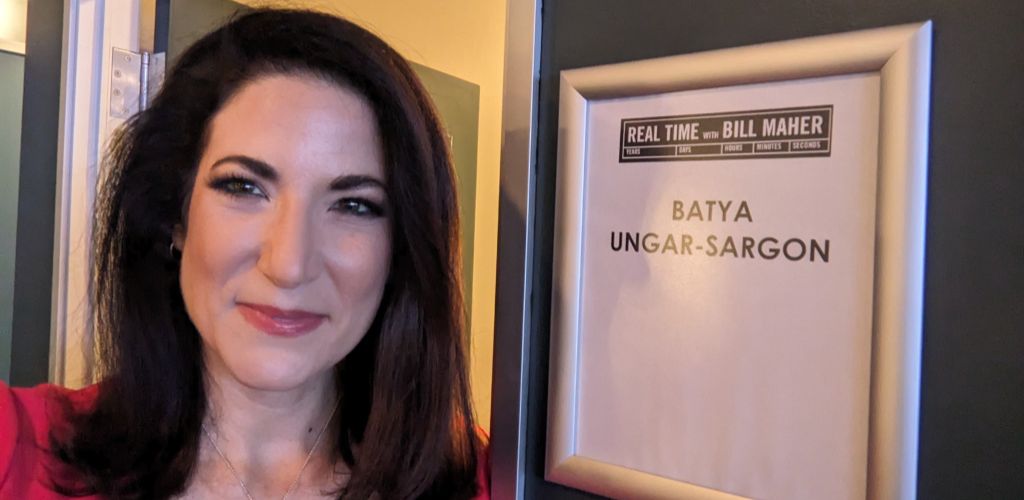Batya Ungar-Sargon is a prominent figure in the media landscape, known for her insightful commentary and exploration of cultural and political issues. One of the intriguing aspects of her identity is her ethnicity, which plays a significant role in shaping her perspectives and professional endeavors. As a journalist and editor, she has often addressed topics related to identity, culture, and the complexities of belonging in a diverse society. Understanding the nuances of Batya Ungar-Sargon's ethnicity can provide deeper insights into her work and the viewpoints she presents.
In a world where identity often intersects with professional narratives, examining Batya's background allows us to appreciate the diversity of experiences that contribute to her unique voice in journalism. Throughout her career, she has tackled difficult subjects, often drawing from her own background and experiences to inform her analysis. This article aims to delve into the ethnicity of Batya Ungar-Sargon and how it influences her work and worldview.
As we explore the topic of Batya Ungar-Sargon’s ethnicity, it’s important to consider how her cultural heritage informs her perspectives on various issues. Ethnicity is not just a label but a complex tapestry of experiences, beliefs, and historical contexts that shape an individual's identity. Let’s uncover the layers of Batya's identity by examining her biography and personal details.
What is Batya Ungar-Sargon's Background?
Batya Ungar-Sargon was born into a family with rich cultural roots, which have significantly influenced her career trajectory. Her background includes a blend of traditions, beliefs, and experiences that reflect the diversity of her heritage. This multicultural upbringing has equipped her with a unique lens through which she views the world.
What Can We Learn from Batya Ungar-Sargon's Biography?
| Detail | Information |
|---|---|
| Name | Batya Ungar-Sargon |
| Date of Birth | 1984 |
| Nationality | American |
| Profession | Journalist, Editor |
| Notable Works | The Forward, Newsweek |
How Does Batya Ungar-Sargon Identify Ethnically?
Batya Ungar-Sargon identifies as a Jewish American, which is an integral part of her ethnic background. Her Jewish heritage has played a crucial role in shaping her perspectives on social justice, community, and identity politics. Throughout her career, she has often explored themes related to her ethnicity and its implications in contemporary society.
How Does Batya Ungar-Sargon's Ethnicity Influence Her Work?
Batya's ethnicity deeply informs her journalistic narratives. In her writing, she frequently addresses the complexities of identity, particularly in relation to Jewish culture and experiences. By sharing her own story and perspectives, she fosters a greater understanding of the diverse experiences within the Jewish community and beyond.
What Topics Does Batya Ungar-Sargon Cover Related to Ethnicity?
- Identity Politics: Analyzing how different ethnic groups navigate political landscapes.
- Cultural Heritage: Exploring the significance of cultural traditions in modern society.
- Social Justice: Advocating for the rights and recognition of marginalized communities.
- Intersectionality: Examining how various identities intersect and influence experiences.
What Challenges Does Batya Ungar-Sargon Face as a Journalist?
As a journalist of Jewish descent, Batya faces unique challenges that stem from her ethnicity. In an era of rising antisemitism and cultural polarization, she often finds herself navigating complex discussions about identity, representation, and belonging. These challenges compel her to address sensitive topics with honesty and integrity, ensuring that her voice resonates with a diverse audience.
What is the Impact of Batya Ungar-Sargon's Ethnicity on Her Audience?
Batya Ungar-Sargon's ethnicity allows her to connect deeply with her audience, providing a relatable perspective that many can appreciate. By sharing her experiences and insights, she encourages dialogue and reflection on crucial issues surrounding identity and belonging. Her voice resonates with those who seek to understand the nuances of culture and the impact of ethnicity on societal dynamics.
How Can We Support Batya Ungar-Sargon's Work?
Supporting Batya Ungar-Sargon’s work can be done in several ways:
- Engage with her articles and share them on social media.
- Participate in discussions about ethnicity and identity.
- Support platforms that promote diverse voices in journalism.
- Encourage open dialogues around sensitive topics she addresses.
What is the Future of Batya Ungar-Sargon's Career in Journalism?
As Batya Ungar-Sargon continues to make her mark in journalism, her unique ethnic background will undoubtedly remain a significant aspect of her work. With an increasing focus on diverse narratives and representation in media, she is well-positioned to lead conversations that challenge stereotypes and promote understanding among different communities. Her commitment to addressing the complexities of ethnicity ensures that her voice will continue to be relevant and impactful in the years to come.
In conclusion, Batya Ungar-Sargon's ethnicity plays a pivotal role in shaping her identity and work. By exploring her background and the influence it has on her journalism, we gain valuable insights into the importance of representation and the power of diverse voices in the media landscape. Through her work, Batya inspires others to embrace their own identities while fostering a greater understanding of the complexities that define us all.
You Might Also Like
Exploring The Life Of Emily Carver And Her ChildrenExploring Patrick Dempsey's Age In Grey's Anatomy Season 1: A Journey Through Time
Unveiling The Mystery: Who Is Jerry Cantrell's Wife?
Exploring The Life And Legacy Of Keisha Chambers
Connections Of Legacy: Is Haleigh Bryant Related To Kobe Bryant?
Article Recommendations


